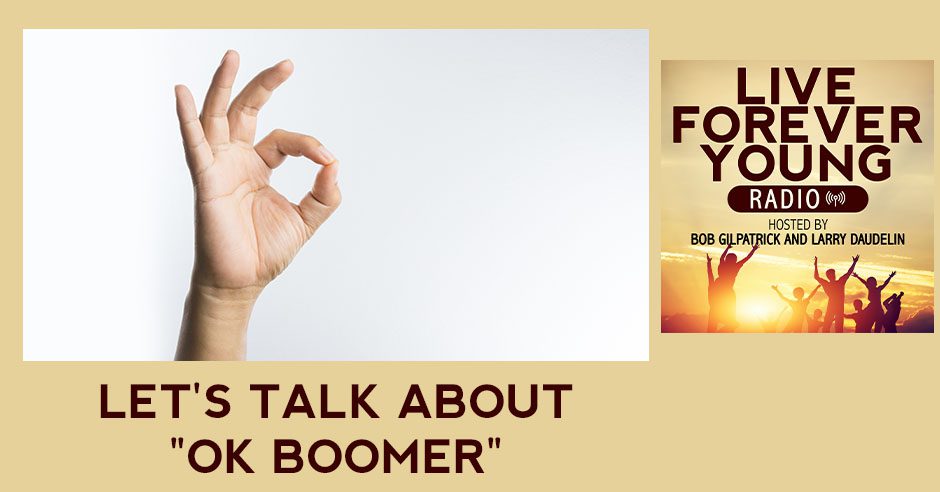Let's Talk About "OK BOOMER"

No matter what your age is, chances are you have heard the phrase “OK Boomer” before, but what is the phrase saying about us as humans and our need to be better?
Today on the show, Bob Gilpatrick and Rollie Culp talk about the “OK Boomer” phenomenon. They share the phrase's history from its beginning on social media to its use in mainstream culture. Where do people get off creating this type of negativity?
In this episode, they analyze the driving factors behind what causes negative stereotypes and what you can do to get past the negative so you could begin to listen and observe others without judgment. Listen, gain powerful insights and live forever young.
Watch the podcast here:
Listen to the podcast here:
Let's Talk About "OK BOOMER"
Using Comparative Observation To Devalue Others
Chances are no matter what your age, you've heard the phrase “OK Boomer” before. What is the phrase saying about us as humans and our need to be better?
On the show, Bob and Rollie talk about the Ok Boomer phenomenon. They share the history of the phrase from its beginning on social media to its current use in mainstream culture.
They also analyze the driving factors behind what causes people to create negative stereotypes and what you can do to get past the negative and begin to listen and observe others without judgment. Inform yourself for your health and Live Forever Young.
---
Rollie, how are you? I'm doing good. I can't complain. I'm here, I'm with you, and whenever I'm with you, it's a good time. Rollie, we're going to talk about this weird thing called, “OK Boomer.”

OK Boomer: People create sets of beliefs and values. In some cases, they consider themselves to be right and superior.
I'm sure everybody's heard about it. I am a Baby Boomer. I was born in 1956 and Boomers were born starting in 1946 up through 1964. I'm right in the middle of the Baby Boomers. What this means is that there was this large group of people who were born right after World War 2 when all the soldiers came back. There's this boom of baby births.
Did you see the picture of the sailor kissing the lady? That's just one. There were about 76 million people born during that time. On the other hand, you are not a Baby Boomer. You're not that old. I was born in 1982. I’m a Millennial. I am right after the Millennials.
The Millennials are supposed to be from ‘81 through to ‘94. I'm two years removed from what would be the prior generation, which is Gen X. Gen X is from ‘65 to ‘79.
There's this general readiness to believe by each cohort. I say generalist because it's a generalization. You have this rift where the Boomers look at people that are younger and they're like, "Kids these days," even though they're full-grown adults.
They have these various generalizations they have about them. The kids who for a long time were silent about this devaluing of them came back all of a sudden in 2009 with OK Boomer. It's not like, "Okay, Boomer.” It's, “OK Boomer.” It's like, “You're so old and you're so out of touch. You don't know what's going on but don't worry, you're okay, old man or old woman. OK, Boomer.”
The younger generations were not talking back. That's what they were taught. Around 2009 on Reddit, the first use of the phrase OK Boomer occurred. It stayed dormant. They didn't use it a lot, but then as we got tired of hearing being called, "These kids these days," like we’re irresponsible, we started firing back with OK Boomer. It got popular around 2019 on TikTok. It was one of the biggest things that made it big and it was a rebuttal to ranting Boomers.
The ones that are saying, “Stay off my lawn, you damn kids.” That's where it came from. It has become part of mainstream media too. It's not just TikTok. I was watching ESPN and there was a commentator there. They asked him a question, "What do you think about this decision that a particular coach had made or something that he said?"
His response was, "That was a real Boomer type of thing that he said." What it meant was that old man coach is out of touch and it's now mainstream. ESPN is mainstream media and you have one of their well-known commentators, I won't mention his name, saying, "That was a real Boomer thing to say."
I've also heard it on different news media outlets when they're talking about not just the phenomenon of OK Boomer, but when they're talking to maybe an older pundit who's giving their opinion and they'll say, "OK, Boomer,” then they'll move on.
These are generalizations because if you were to ask a person who was a Millennial, "What do you think of Steve Jobs?" Steve Jobs created Apple computers and the iPhone and he's a Boomer. You can go on with people who are Boomers.
You notice, Rollie, I said, “People who are Millennials and people who are Boomers," because we're all people first and then we have various characteristics sometimes based on our race, religion or age. We have characteristics. We always want to use the phrase, "People who are," because it changes the narrative, it changes the psychology.
There’s a difference when you say, “People who are older” or “Old people.” It's not about what you say. It's how you say it. What are the driving factors behind this? Where do people get off creating this type of negativity? Why is it necessary to say it to somebody?
Here's the thing. People create sets of beliefs and sets of values. They consider themselves to be right, and in some cases, superior. That's just a way that people develop their self-esteem. It's very typical in children as they get older. Teenagers will call other kids names based on their height, their weight, whether they're smart or not so smart, and they'll make fun of each other. What it's doing for their self-esteem is, “If I make you bad, therefore I can be good,” and worse yet, “I can't be good unless you are bad.” It's comparative observation.
Is that something that maybe could have come from trying to survive back in the day and maybe looking at things like that person is not working? Let’s say caveman times like, "That person is not working as hard. They're not as good as me and I'm out there working."
I think it’s more territorial. There are some real territorial neurotransmitters because people back in the caveman days had either a territory or they were wandering, but they needed to have a certain space that was theirs where they could hunt and gather. If neighboring tribes infringed on their area, people would become very territorial. It helped when you were territorial if you devalued the people who were trying to come into your territory because if you were to make them less than you, it was okay to injure or kill them.
Keep them off your territory. You even see that in more modern-day wars where people would devalue the enemy with derogatory phrases. I won't mention names, but people know what we're talking about. This type of strategy of making oneself feel better with comparative observations is very well understood with the onset of the discipline of NLP. Neuro-Linguistic Programming was pioneered in 1978 under that name when there were two scientists, Dr. Bandler and Dr. Grinder.
They were studying the world's best psychologists. For example, Milton Erickson was so famous that he was on the cover of Time Magazine and Life Magazine in the same year. He was considered this magical therapist who had these very high-level linguistic skills that were used for helping people get better from mental illnesses.
There were others, too like Virginia Satir who was the founder of modern-day group therapy, and Fritz Perls, another famous psychologist. Bandler and Grinder studied them. In most cases, the famous psychologists weren't 100% aware of what they were doing. It came naturally to them. Bandler and Grinder set about to digitize it and analyze it, so it could be taught to other people.
They wrote a book when they were finished with their research called The Structure of Magic and that was the first book about Neuro-Linguistic Programming. They began teaching psychologists what they had learned. It blossomed into an entire industry in the field of psychology called NLP. Quite often, people who study NLP or become certified in NLP study Ericksonian hypnosis at the same time. It's similar but two different things, but they go very well together since a lot of the NLP came from the work of Milton Erickson.
What we know from those studies is that people have filters in their minds. They tend to do three things with pieces of information that come at them. One is they'll delete, two is they'll distort, and three is they will generalize. 
OK Boomer: Awfulizing is simply when an event happens, and you perceive it to be awful; it changes your neurochemistry and closes your mind down to possibilities.
Deleting sounds like you just don't remember it. Whatever the situation was, you decide, "I don't even want to think about it." "If it doesn't fit, I don't want to think about it." People have the sets of beliefs that they've created about themselves and life in general, and about other people. If something comes at them that doesn't fit that narrative, they ignore it.
That's deletion. Distorting means that they blow it out of proportion. That was terrible. That was awful. There was another psychologist that coined the phrase awfulizing. Awfulizing is simply when an event happens and someone perceives it to be awful. Because you've perceived it to be awful, it changes your neurochemistry and the way your heartbeats. It closes your mind down to possibilities.
Distortion is definitely something that causes a lot of problems. The third being generalization fits with what we're talking about here, OK Boomer, because if you are saying, "OK Boomer," you're generalizing in a sense that all Boomers are like that. It’s the same if you say, "Kids these days," you're referring to all kids, when very clearly not all kids are behaving in the way that Millennials are generalized and characterized.
A great example is the young girl who did a speech at the inauguration. I can't think of her name right now, forgive me for that. She wrote a beautiful speech and everybody was like, "She's amazing. She's a Millennial. She's a kid these days." It's like what we were talking about with the guy who owns Virgin, Richard Branson and Jeff Bezos. These guys are Boomers and they're up in space.
They’re not out of touch. They're still leading the way. This generalization is not always a fit and most times, it's not true. Generalization is what leads to what's called stereotypes. When you say, “OK Boomer.
All Boomers are out of touch,” that's a stereotype. A stereotype is this generalization and it can be used to harm large groups of people. A good example of that was the concept of deinstitutionalization. Back before the time of President Kennedy, many people were put to live in institutions if they were a person with a developmental disability, a person with a mental illness, even physical illness.
They were put into these almshouses and all live together. They were shunned away from society. In 1964, President Kennedy who had a relative with a disability decided, “Why don't we try helping these people live in our communities?” That became the dawn of things like group homes for people with developmental disabilities and apartment programs for people with disabilities.
They began to have people come out of institutions and live in the community. A big driving force was an exposé done by Geraldo Rivera about an institution called Willowbrook. As a result of his investigation and exposé, there was a consent decree called the Willowbrook Consent Decree, which began to give energy to deinstitutionalization. The next thing you would have is a group home, which was in a community.
You'd have a home where maybe 6 or 8, usually just men or just women but later became integrated. Those people would live right in the community. They had live-in supervisors and trainers to teach them skills of daily living that they need for living outside the institution. However, you had tremendous resistance to this because the people in the neighborhood were like, "We don't want that in our neighborhood."
Why wouldn't they want that in their neighborhood? It's because of a stereotype. It's not something you can put your finger on that these stereotyping people are doing, but it's this general readiness to believe that the people that are going to live in this group home are going to always be on the verge of doing something destructive. Whether there’s any proof of that or not.
This is a classic case of a stereotype. This has been overcome to a very large degree because it's been many years since the 1970s when this started to become a normal thing. They became a whole theory put forward by a social work professor in New York whose name was Wolfensberger. He put forward normalization theory which was, "Let's take people who are devalued, who are acting funny because of their circumstances and help them to learn what 'normal' is so that they become normalized into the society and can have friends and can get a job."
They say when people have friends in a job, generally, they're much happier. This became a whole movement, the normalization theory, and then there became this concept they call PASS, Program Analysis of Service Systems. It became a tool that was used by high-level psychologists like Dr. Kendrick and Dr. Dorsey.
They would go to a given nonprofit usually that is helping people with disabilities or groups of people that have been devalued. Back then, it was the elderly also or people who were elderly, including in the nursing home. They would use these booklets and analyze the behavior of the staff, the type of decorations in the facility, where you infantilizing people. If you have a nursing home with pictures of childlike things as opposed to adult-like things, it's not helping them with their moralization.
That was something that you said about the ‘70s when they started, they were going in to make these changes on a big, large scale to try to help normalize those that have developmental disabilities. In a way, it’s become from the study of NLP, in a realization that as a whole, we tend to generalize people that don't fit in to make ourselves feel better in order to be superior. If they had to go through that much in the ‘70s to change the whole institution, what's something that we can do on a daily basis? What's a good strategy that we can employ that would help us to deal with let's say we're getting frustrated by someone who is an older person?
There are books for laypeople about NLP. There's a book called the Magic of NLP Demystified. There's a book called NLP: The New Technology of Achievement. It explains in varying degrees of detail the inner workings of the human mind and behavior. The more you know about it, the more you can stand guard at the door of your mind, and watch yourself participating in behaviors that are devaluing someone or participating in behaviors that perpetuate stereotypes.
My advice for this ESPN commentator would be don't use the phrase Boomer to describe that. It's not because the man was 70 years old that he said that. That was his honest opinion. By saying that was a Boomer-like statement, it's devaluing him and it's perpetuating the stereotype. An understanding of how your own mind works with deletions, distortions, generalizations and making an agreement with yourself to be more mature and open-minded. This brings us to the whole concept of NVC or Nonviolent Communication.
We did a whole show on this. If you guys want to get the details on it, it's called How To Use Nonviolent Communication. This applies in this situation because this will help to figure out how to open that line of communication with maybe someone you don't agree with or someone that maybe you think is out of touch. This is probably the key. It's perfect.
There's an acronym that goes with NVC. It's OFNR. It starts with observing without judgment. Most of the time, when people are having a conversation or listening, they are listening from their own collection of beliefs. In some cases, these are very hard cognitive commitments that they may have created prematurely before having all of the information. When you make a commitment to observe someone else, meaning listening, watching without judgment, and instead focusing on the F part of the acronym, which is feelings, focusing on the person's feelings, then you are at the beginning of a communication strategy that's going to be more productive and more compassionate.
You yourself will open your mind. They say the most powerful thing in the universe is an open mind. You are demonstrating open-mindedness when I'm going to observe with no judgment, no preconceived notions, and I'm going to focus on your feelings. As I begin to get a sense of how you're feeling about something, I can say something about that. "It seems like you feel strongly about this. It seems like you're feeling very disappointed with that person based on what you're telling me. It seems like you're feeling very happy and joyful about what just happened."
When you reflect back that way, instead of having all your own beliefs going on and interrupting and projecting your beliefs onto that person or contradicting them, you go to their feelings. What happened is you've just made a shift in what they call in NLP as primary representational systems which are, "Am I in my kinesthetic?” My feelings. “Am I in my visual?” I see what you mean. “Am I in auditory?” I hear you. “Am I in my auditory digital?”
Meaning my engineering mind. It's good to shift out of one particular set of commitments and move into the kinesthetic. It's more heart-centered, and now I'm in the kinesthetic by talking about the person's feelings. As they begin to confirm my guess about their feelings, modify it, add to it or whatever, then you can move to the next part which is N for needs. You can say something like, “It seems to me that you might need help with this in order to address this feeling that you're having.”
This is also very respectful because it's telling the other person, “I understand that you might need something, and I'm affirming that.” This is where usually you get feedback that goes, “No, I don't really need that, but I do need this." Especially if it's a face-to-face relation that's just between the two people and not a third party, then it leads to the R part, which is a request. A request has to be reasonable. It has to be respectful. It's RRR, Respectful and Reasonable Request.
The other person might come up with the request on their own which is related to what they think they need and how that relates to their feelings. They might not even be able to think of something. The other person who may be having more experience with NVC could say, "It seems to me that if you were to request this of me, I could probably do that type of thing and it might meet your need and make you feel better."
It's a hallucination. It's a guess. You can go right back into observing with no judgment while the person reflects back and responds to your suggested request, and then they're going to modify, come up with a request that's hopefully respectful and reasonable. As the request is received and confirmed, "I understand how you feel," and the person believes you because you've been talking about their feelings.
Usually, when someone says, “I understand how you feel,” they go, "You don’t know how I feel.” How would you know? How would I know? It's because I just spent time talking to you. It's called NVC. We can reflect together and I can say, “I can meet that request because I understand how you feel.” If you want to use a little NLP on top of it, you can say, “I understand how you feel and I can meet that request.
As a matter of fact, I think that if you were to look ahead a couple of weeks from now or a month from now, or even a year from now, what you're going to find is that when I did this thing that you're requesting, then you're going to feel a lot better.” This is called future pacing and it's helpful. It's not manipulative. It's helpful because it's moving the person into an anticipation of success. It enters the two of you into this morphic field of success and makes the outcome much more predictable.

OK Boomer: Distortion is something that causes a lot of problems. It’s the same if you say kids nowadays, you're referring to all kids, when very clearly not all kids are behaving in the way that millennials are generalized.
Morphic field is a cool way to describe it, but what I can see with the technique and with what we were talking about before with the generalization. The generalization occurs because one person has to be up here and one person has to be down here. When you use NVC, it makes that level because you have then considered this person's feeling and this person's feeling, then this person's need, this person's need, and then the response and the request.
The reasonable request is where it can be resolved without deleting, distorting, generalizing, yelling, punching or fighting. We don't need that. I think we said this before when we were doing the show about nonviolent communication. This is a tool that you can use to combat the negativity of things like OK Boomer or things like, “You darn kids.”
The response other than OK Boomer would be from a person who's a Millennial to a person who's a Boomer. If someone said, “You darn kids these days,” you could start a conversation with them and say, “It seems to me like you're feeling a little bit angry about these darn kids these days. Is that right? Are you feeling angry about that?”
"Everybody gets a participation trophy and they don't even do any work for it." There's some truth to that. You got to call a spade a spade, but that feeling that maybe somebody doesn't deserve something is another part of the deleting and the distorting. It's another layer of an onion that you have to peel back and understand why they would feel that way.
Right away, the person who's the person who's the Boomer maybe even imperceptibly starts to soften a little bit because here's a Millennial that wants to talk about his feelings. He can rant and rave and the Millennial could say something like, "It seems like you're disgusted with what's going on these days. It feels to me like maybe you need some relief or a break from all of this negativity between the generations.”
You can begin to have this conversation and now you're a person who's practicing NVC, has knowledge of NLP that’s standing guard at the door of your mind so that you don't react back without understanding people's feelings.
The last part, Rollie, before we sign off here is like this. One of the biggest fallacies in why people are led to these stereotypes, generalizations, and devaluing of others so they can feel good about themselves is that people believe they can't be good unless someone else is bad. “I can't be part of a group that's good unless that group is bad.”
The fact is that everybody is of equal value. Men were created equal, meaning all men and everyone else, all genders. We are all creations of God. We all have a spark of God in us, which is animating our beating hearts. If we can turn our focus to our own divinity, our own spark of God that we have in a way from comparative observations, we can develop self-esteem where we are good simply because we are.
We're here on Earth and as everyone else is, we are valuable human beings with worth and dignity. We are here to create happiness, to create a happy and joyful life. An individual, rather than participating in this negativity, can focus instead on creating their own joy, living with joyful anticipation of the future, as Dr. Dispenza says, and focus on creating your own paradise.
What exactly would have to happen for me to feel like I was living in paradise? There are many religious and spiritual teachers that say paradise is where we live, where we are right now. God only created paradise and Earth is part of paradise. Within this paradise, we're creating our own special version of it through what we pursue and how we treat people.
As we imagine our own paradise to create, we then can begin to feel that and to see it in our mind's eye and then live it out. Live out this set of new forward-looking beliefs that you have and then share it. Here's me. Here's Rollie. Here's Bob. Let me share my paradise with you and you share your paradise with me. Rollie’s paradise is he loves the Tampa Bay Lightning and hockey in general. That's why it's so fun for me to hear you talk about it because it's you sharing a slice of your paradise with me. This is your note. Each person gets to play a note for the universe. It's an orchestra of beautiful music, God's universe, and we each play one note, and every note is different.
You wouldn't want every note to be the same. It wouldn't be music. Whatever note it is that you choose is emanating from the paradise that you've created. It literally changes the forces that are coming off your body when you are creating from a place of joy and paradise, as opposed to a place of grumpiness and comparative observations. It literally changes the pulsed electromagnetic forces that are coming out from your brain and coming from your heart muscle. Actually, we've talked about that on a prior show.
This is your note and your note has a signature, and it has a very specific wave that could be measured coming from your heart. You can move away from the stereotypes and devaluing like the “OK Boomer” or “Kids these days.” You move into simply focusing on your own joy, the creation of your own paradise and share it with the universe as the most beautiful note that you can play at this very moment.
Enjoy the notes from other people that have created a beautiful note to be shared with everyone else. You can bask in it and then you can join your notes together, share them with another person. You have gatherings. You have workplaces with people that are working together, you have families. This is a path forward away from all this extreme negativity that we are experiencing.
Starting back in early 2020 is when it started to get more heightened and more contentious. This is a strategy that was put together by the most famous therapists in the world, Milton Erickson, Marshall Rosenberg who created NVC, Fritz Perls, Dr. Bandler and Dr. Grinder, teaching us the whole science.
We have spiritual teachers like Rasha or Dr. Dispenza, spiritual teachers who are teaching from different religious standpoints. We have all this information in order to move past this temporary time of this whole conflict and move into this new age of Aquarius, harmonizing together using these tools
You think about the way that you say these things when you create a morphic field. It's going to have some harmony to the notes that he chose to play. As you said, if we were all the same, it'd be boring. Let's get past the negative. Let's stop generalizing. Let's listen and observe without judgment. We can do it. I know we can.
Thank you for reading.
We will see you at the next show.





Leave a comment